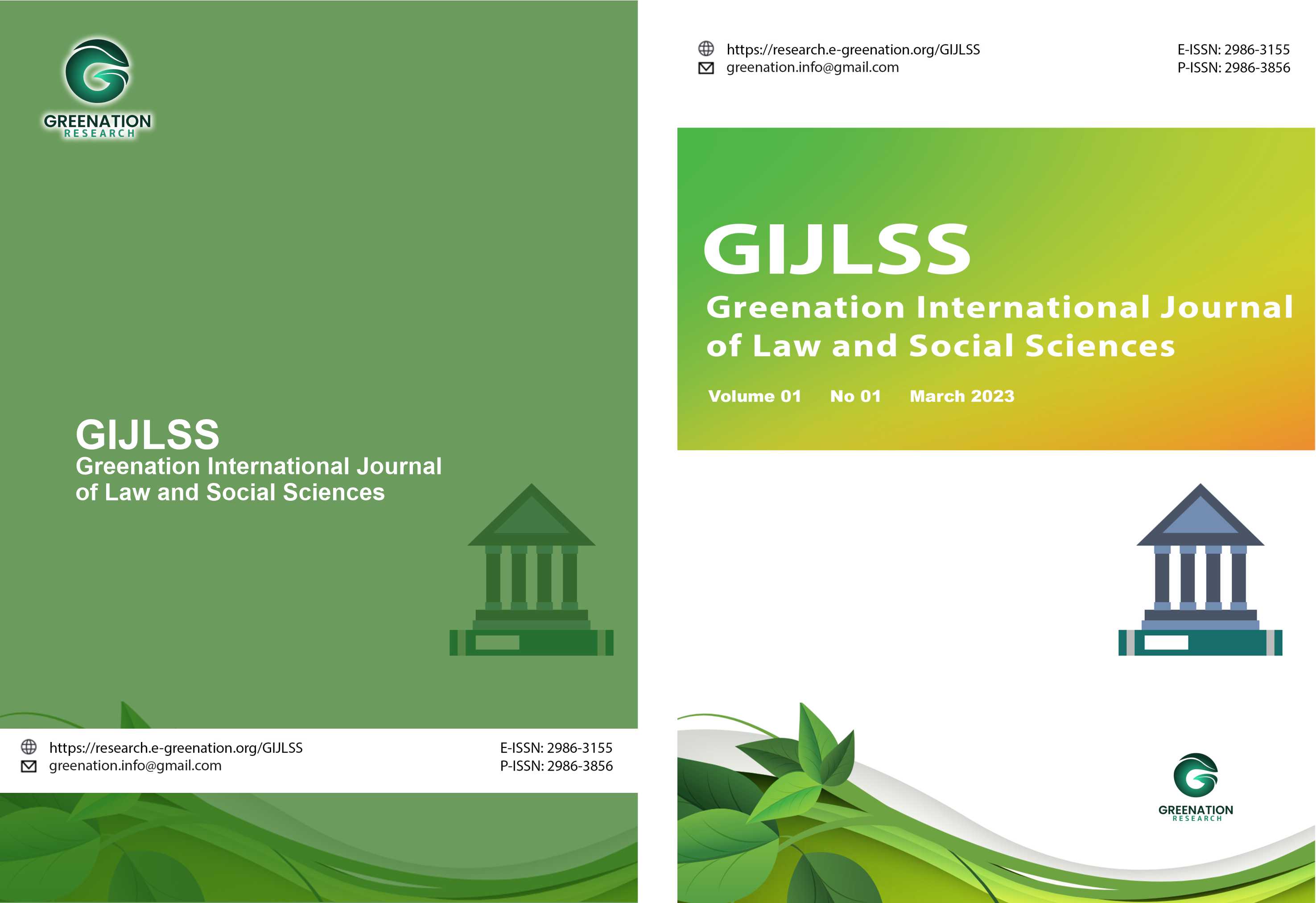Consolidation of Executive Power and the Erosion of Public Participation in Omnibus Law Legislation in Indonesia
DOI:
https://doi.org/10.38035/gijlss.v3i3.597Keywords:
Consolidation of executive power, public participation, Omnibus Law, legislation, constitutional democracyAbstract
This paper examines how Indonesia's Omnibus Law legislation has accelerated the consolidation of executive power and the effects of declining public participation in the legislative process. Government Regulation in lieu of Law Number 2 of 2022 and the adoption of Law Number 11 of 2020 concerning Job Creation, which was later stipulated as Law Number 6 of 2023, demonstrates executive dominance in the legislative process. The accelerated formation mechanism, minimal public involvement, and the formality of the public consultation process raise constitutional issues related to the right to participation as guaranteed in Using This study uses a normative juridical method with a statutory, conceptual, and historical approach, drawing on primary legal materials such as the 1945 Constitution, Law Number 12 of 2011 in conjunction with Law Number 13 of 2022 concerning the Formation of Legislation, and the Constitutional Court Decision Number 91/PUU-XVIII/2020. Articles 28E and 28F of the Republic of Indonesia's 1945 Constitution, which declared the Job Creation Law conditionally unconstitutional. The research findings indicate that the consolidation of executive power has shifted the balance of checks and balances, weakened the deliberative function of the House of Representatives (DPR), and neglected the principles of openness and meaningful participation, potentially reducing the legitimacy of laws and public trust in the legislative process, while also posing challenges to the principles of the rule of law and constitutional democracy. This research recommends strengthening substantive public participation mechanisms, enforcing the principle of openness in accordance with Law 12/2011 in conjunction with Law 13/2022, and effective judicial oversight by the Constitutional Court to ensure that laws are enacted in accordance with the principles of participatory democracy.
References
Abdullah, A. (2025). Reformasi Hukum Dalam Cengkeraman Oligarki: Menelusuri Kesenjangan Legitimasi Konstitusional Dan Kepentingan Elite. Jurnal Penelitian Serambi Hukum, 18(01), 85-100.
Abdullah, F. F. (2024). Peran DPR RI Dalam Membangun Negeri Untuk Memajukan Kesejahteraan Rakyat. Jurnal Pengabdian Jejamo, 1(1), 38-46.
Anwar, U. A. (2025). Hak Dan Kewajiban: Pilar Demokrasi Indonesia. Lamongan: Detak Pustaka.
David, J. (2025). Implikasi Pembentukan Undang-Undang Dengan Metode Omnibus Law Dari Perspektif Hukum Tata Negara. Lex Privatum, 15(1). Unsrat E-Journal
Fahira, Y. (2025). Sistem Checks And Balances Dalam Menjaga Prinsip Demokrasi Di Indonesia. Jurnal Media Akademik (JMA), 3(6).
Hadji, K. A., Azizah, A. F., Aulia, P., Pandini, A. I., Oktasani, R., & Patmawati, N. (2025). Eksistensi Lembaga-Lembaga Negara Independen Dalam Mewujudkan Sistem Pemerintahan Demokratis Dan Konstitusional. Judge: Jurnal Hukum, 6(01), 94-100.
Hilyati, A. S. (2025). Menuju Kesejahteraan Melalui Partisipasi Masyarakat Dalam Proses Legislasi Di Indonesia. Indonesian Journal Of Islamic Jurisprudence, Economic And Legal Theory, 3(2), 1251-1266.
Kurniawan, I. D. (2023). Keterlibatan Masyarakat Dalam Pembentukan Undang-Undang Sebagai Bentuk Implementasi Demokrasi. Jurnal Analisis Hukum, 6(2), 196-213.
Mayasari, I. (2020). Kebijakan Reformasi Regulasi Melalui Implementasi Omnibus Law Di Indonesia. Jurnal Rechts Vinding: Media Pembinaan Hukum Nasional, 9(1), 1.
Pelokilla, J. (2023). UUD 1945 Sebagai Landasan Konstitusional Terhadap Perlindungan Hak Warga Negara Indonesia. JOCER: Journal Of Civic Education Research, 1(1), 24-28.
Pratama, N. A. (2022). Meaningful Participation Sebagai Upaya Kompromi Idee Des Recht Pasca Putusan MK No. 91/PUU-XVIII/2020. Crepido, 4(2), 137-147.
Purwanto, P. S. (2024). Streamlining Regional Regulations With Omnibus Law For Legal Harmonization. Rechtsidee, 12(2), 10-21.
Riskiyono, J. (2022). Pengaruh Partisipasi Dan Pengawasan Publik Dalam Pembentukan Undang-Undang. Jakarta: Publica Indonesia Utama.
Rudy, R. S. (2024). Pemantauan Dan Peninjauan Undang-Undang Dalam Siklus Pembentukan Peraturan Perundangan-Undangan. Proceeding APHTN-HAN, 2(1), 319-354.
Said, A. R. (2024). Hak Angket Dalam Penguatan Fungsi Pengawasan Dewan Perwakilan Rakyat Republik Indonesia. Binamulia Hukum, 13(2), 361-376.
Suhardin, Y., & Flora, H. S. (2023). Eksistensi Putusan Mahkamah Konstitusi Pasca Disahkannya Undang-Undang Penetapan Perpu Cipta Kerja. Jurnal USM Law Review, 6(1), 320-331.
Tuhumena, C. J. (2021). Partisipasi Masyarakat Dalam Pembentukan Undang-Undang. TATOHI: Jurnal Ilmu Hukum, 1(3), 248-256.
Widjaja, G. (2022). Omnibus Law Diterapkan: Prediksi Antara Reformasi Politik Dan Hukum Di Indonesia. Gorontalo Law Review, 5(1), 1-13.
Zebua, D. E. (2022). Analisis Hukum Pembentukan Undang-Undang Nomor 11 Tahun 2020 Tentang Cipta Kerja Dalam Perspektif Pembentukan Peraturan Perundang-Undangan. Nommensen Journal Of Constitutional And Administrative Law, 1(1), 1-12.
Downloads
Published
How to Cite
Issue
Section
License
Copyright (c) 2025 Kaitanus F.X Mogahai, Evita Isretno Israhadi

This work is licensed under a Creative Commons Attribution 4.0 International License.
Copyright :
Authors who publish their manuscripts in this journal agree to the following conditions:
- Copyright in each article belongs to the author.
- The author acknowledges that the Greenation International Journal of Law and Social Sciences (GIJLSS) has the right to be the first to publish under a Creative Commons Attribution 4.0 International license (Attribution 4.0 International CC BY 4.0).
- Authors can submit articles separately, arrange the non-exclusive distribution of manuscripts that have been published in this journal to other versions (for example, sent to the author's institutional repository, publication in a book, etc.), by acknowledging that the manuscript has been published for the first time at GIJLSS.























